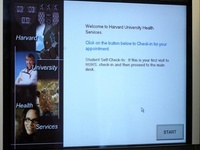Katherine T. Kleindienst ’05 says she was diagnosed with depression after 20 minutes of triage, then spoke to a nurse practitioner for about an hour and walked out of UHS with a prescription for the anti-depressant Lexapro.
“It’s really short for someone who you’ve never met to get an idea of what is going on with you,” Kleindienst says.
Hyman, who chairs the UHS executive committee says that prescribing medication to a student after an hour’s evaluation is a legitimate medical practice.
“This is more complicated than strep throat by far, but this is a serious illness and you don’t want to have to schedule three appointments to get a prescription for an SSRI,” Hyman says, referring to a common class of anti-depressants. “A skilled clinician can certainly in an evaluation tell whether someone warrants treatment.”
Episodic Care
While UHS’s triage system allows students to get care more quickly, another new system attempts to get them out of therapy more quickly too.
Under a policy begun this fall known as the “episode of care,” UHS decided to conserve resources by roughly limiting student therapy to two- to four-month treatment courses.
Kadison says the “episode” is more a guideline than a limit, but that seeing a student weekly for up to four months is roughly what UHS can offer within its budget.
“We realize that we cannot offer open-ended weekly therapy to the whole community because we wouldn’t have the resources,” Kadison wrote in an e-mail.
He says that UHS has always informally followed this guideline and recently formalized it.
Experts say that therapy can be effective in a short period of time, but some students say they feel abandoned when faced with the possibility that they might have to end their therapy before they’re ready.
Hilary C. Robinson ’03 says she was “shocked” when a UHS therapist told her about the episode of care policy this fall.
“He said there’s been a new policy, and that it’s very much a ‘how long will it be to fix this’ type of thing,” says Robinson, who is now a first-year law student. “It seems like they really want to set an end date, to get people working towards an end date…the thought is to expedite care. It might be appealing to students to just get it over with, but…it’s just not that easy.” A female junior, who has suffered from an eating disorder since high school, says she had been seeing a UHS therapist for almost a year when the therapist told her about the policy last spring.
“She asked me some questions to gauge whether I should continue seeing her, what progress had been made and what my goals were,” she says. “I sort of expected that we might evaluate where I was, but it was a little scary because I really didn’t want to stop seeing her.”
Now, she sees the therapist once every three weeks as opposed to the weekly appointments she had last year.
Read more in News
Chapel May Remain in Cambridge Permanently














